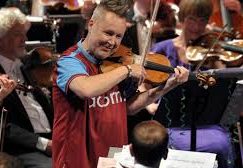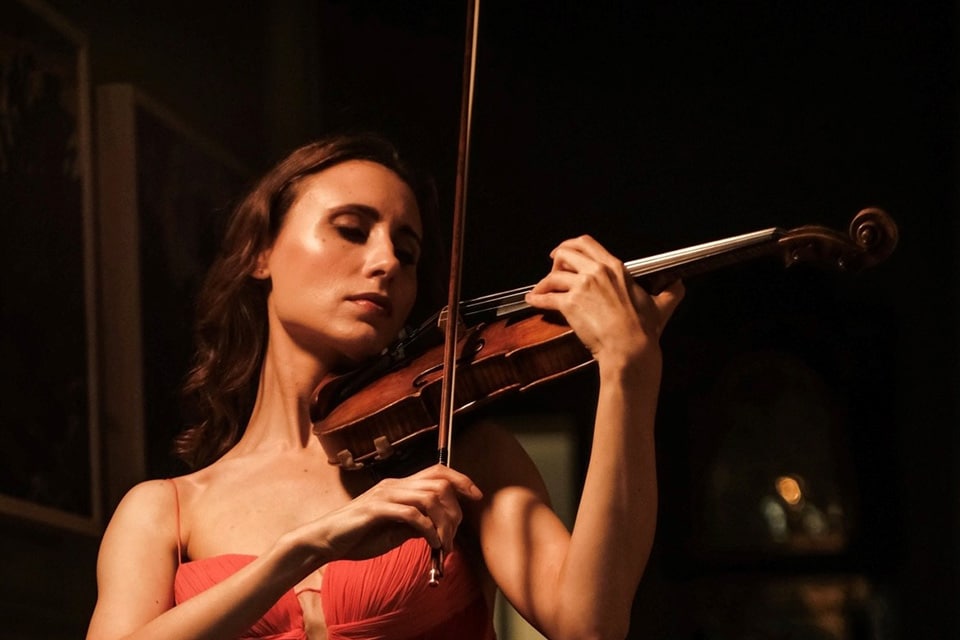Danes call mass demonstration to protest orchestra abolition
mainHundreds gathered this afternoon at Copenhagen’s main railway station to protest the Danish Radio’s decision to abolish the Danish Radio Chamber Orchestra. The demo was led by members of the Copenhagen Philharmonic and ended with the singing of the national anthem.
There were further demos on the streets of the city, one of them led by national treasure Michala Petri.
We’re expecting video shortly.
Meanwhile, here are first pics.


(c) Mahan Esfahani





I sure hope today’s protests will make a difference. The situation that the Danish Radio Chamber Orchestra has been put in is completely unnecessary and easily avoidable.
After a cost overrun of ~77 million Dkr (on a ~33 million Dkr. budget!!!) for staging the Eurovision Melodi Grand Prix, the wholly-publicly financed Danish Radio & TV (DR) corporation was told by the Danish government politicians that it must save 106 million Dkr on its budget. Then the management and board of DR decided that that wasn’t enough; they wanted to “save” (actually, it’s “use,” but DR is touting it as “savings” to make it more palatable) another 55 million than demanded by the politicians. So they simply gave the Danish Radio Chamber Orchestra (42 musicians) the chop along with some 100 other employees at DR.
I said “use” instead of “save,” because DR’s management plans on enlarging the Danish Radio Symphony Orchestra, hire Fabio Luisi (for an undisclosed sum) and invest in “reaching out to youth” and “keeping up with technology.” the Danish Radio Symphony Orchestra has already started calling “select” members of the defunct-to-be Danish Radio Chamber Orchestra members to offer them jobs in the enlarged-to-be Danish Radio Symphony Orchestra.
Now DR is refusing to show politicians their accounting for the Melodi Grand Prix mess, referring to an obscure paragraph in Danish law regarding their public financing. They have also not put forward any kind of plan or rationale for how they’re going to use the 55 million Dkr that they’re “saving,” which has led to the Danish Radio Chamber Orchestra being axed. A better “Nacht und Nebel” performance has not been seen in many a decade, and I’m not referring to the band or Wagner’s “Rheingold.”
If you visit the website of DR, dr.dk, you will find all the apps and internet devices that are current in the world of mobile and Wifi technology. HDTV programming has been standard on all channels for at least a decade. What kind of technology is it they don’t have that costs tens of millions of Dkr? Anyone who’s half-tech savvy must be puzzled by what it is DR wants.
As for reaching out to younger audiences, DR is shooting itself in the foot. First, DR’s own consumer data indicates that the average age of its listeners and viewers is 40.5 years of age. Second, anyone who studies consumer stats for radio and TV consumption by young people knows that no mass media company is able to reach them effectively today; they’re notoriously fickle and spread out over social media and various apps.
In other words, young people don’t listen to radio much except via internet radio apps, Spotify, Pandora or similar media which enables individualized playlists and programming that is easily shared through mobile phones and social media. When have you last seen your kid sit and turn on the radio and listen carefully to an entire broadcast when they can get what they want instantly on the internet at no charge?
The same, more or less, goes for TV, where YouTube and other video providers enable the same kind of immediate sharing of personal choices of videos. So unless DR is planning on launching their own versions of Facebook, Spotify, YouTube etc. they’re not going to get the attention of young people and make them listen to or watch more programmed media. That’s Marketing 101 today, but I guess that nobody at DR really understands the mechanisms which make videos “go viral” on the internet.
Instead, DR chooses to shut down its pops orchestra, which performs for more Danes than any other orchestra in Denmark, and offers outdoors summer concerts, cross-over programming with pop and rock artists, experimental music, etc. far beyond any other orchestra in Denmark. In other words, DR is shutting down the only orchestra which has a prayer at reaching a broad audience, including young people.
The Danish Radio Symphony Orchestra with Fabio Luisi isn’t going to be performing any pops or outdoors concerts anytime soon, I think. So in order to try and capture a market segment that basically has clearly indicated – through the popularity of social media and streaming – that it doesn’t want anything that’s pre-programmed, DR is denying its core audiences of somewhat older people the kind of music they actually enjoy listening to live on radio or watching on TV.
Unfortunately, the whole thing seems to be a done deal. The Danish Musician’s Union (DMU) has excelled in handling this matter through its absence and lack of involvement. Instead of leading the charge, the DMU has left the Danish Radio Chamber Orchestra musicians to organize today’s protests all on their own. All the work DMU seems to have put into this matter are two articles in their membership newspaper: DMU is really sorry about this “loss for Danish cultural life.”
Furthermore, DMU has not lifted a finger to prevent that musicians are hired by the Danish Radio Symphony Orchestra before the shutting down of the Danish Radio Chamber Orchestra is actually settled. Since a quite a few Danish politicians and political parties were caught unawares by DR’s plans to shut down the orchestra in the middle of its season, there’s a definite chance that the matter may yet be debated in parliament, and not just by DR’s management and board.
What kind of musician’s union allows this sort of “cannibalism” to take place by its members while an orchestra of its members is fighting to get its dissolution overturned?!? One which represents multiple interests, i.e., classical musicians from all orchestras and ensembles in the country as well as all other kinds of musicians, obviously.
DMU’s chairman Anders Laursen is no novice, so he must be aware of this conflict of interest between DR’s two orchestras, as well as the possibility of a political resolution of the matter before all is said and done. The DMU’s lack of involvement and initiative actually makes one think that Mr. Laursen may have had afternoon tea with the management of DR and the Minister of Culture, Marianne Jelved, to strike a bargain under the tea-table to enable DR’s management and board to carry out the disbandment of the Danish Radio Chamber Orchestra with the least trouble and work possible for everyone around the tea-table.
DR has tried to shut down the Danish Radio Chamber Orchestra before, mainly because of the longstanding ambitions of the Danish Radio Symphony Orchestra’s management to have a larger orchestra than its current 99 members. It is not seemly to be smaller than the Berliner or Vienna Philharmonnics. Thus closing the Danish Radio Chamber Orchestra is nice and easy, and the DMU won’t have to work too hard before the dismissed musicians get to go on early retirement or unemployment benefits for 2 years while retraining for “other work” if they need an extension. Except for the 5-10 musicians who have been offered jobs by the Danish Radio Symphony Orchestra, the rest won’t have an alternative except seeking employment abroad. And how do you do that when you have a family?
It’s no secret that Mr. Laursen’s main interests lie in the direction of pop and rock music, and that he is not too different from Ms. Jelved’s, the previous Minister of Culture’s, and the current Danish government’s tastes in that respect. Oh, I forgot to add that the Danish Radio Big Band is in for a boost and enlargement, too, if the proposed extra cuts are implemented. So it would seem that the decision-makers are in synch about the “benefits” they’ll each get out of shutting down the Danish Radio Chamber Orchestra. In a country as small as Denmark, where most everyone is related to everyone else in one way or another or knows the people involved personally, such a scenario is not too far-flung from one’s imagination.
All in all, this situation makes one suspicious that something is blatantly rotten at top levels in DR, the Danish Radio Symphony Orchestra and DMU. Other Danish orchestra musicians have expressed strong support for the Danish Radio Chamber Orchestra as well as their displeasure at its closure. Meanwhile, the management sharks are already circling in the water to get their cut of the lucrative pops concerts that the Danish Radio Chamber Orchestra performs all across Denmark each year, which attract audiences in the tens of thousands. But then, Danish orchestras and other state-run ensembles have been complaining that they don’t get a fair share of broadcasting exposure from DR for decades. Crocodile tears flow freely in Denmark these days.
This is a shame, another one. And there is not one week now without such events.
How many orchestras (and choirs, and ensembles of all kinds, and festivals…) have to disappear before these supposedly “pro-good-government” decisions are massively opposed ? What do we pay taxes for, if not, in great part, for the quality of our cultural and educative institutions ? When will all the Merkels, Barrosos, Junckers or Valls will be happy ? What is their idea of culture in Europe ? Let’s keep a festival in Bayreuth, an orchestra in Berlin, an opera in Paris, that will be sufficient for the “1%”… And then ? Let’s slash everything else ?